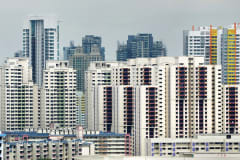Property Launches & Investments
This is some blog description about this site
Is the Heat Off Asia’s Hottest Property Markets?
- Font size: Larger Smaller
- Hits: 1666
- 0 Comments
- Subscribe to this entry
- Bookmark
Jones Lang LaSalle's Residential Index monitors luxury apartments, condominiums, detached and semi-detached housing located in prime areas. Analysts say the luxury residential market offers a good indicator of the mass property market as all sub-sectors tend to move in tandem.
Other data have also shown that prices are cooling in these two countries. Data from Singapore's Urban Redevelopment Authority showed that private property prices in the first three months of 2013 rose only 0.5 percent in contrast to a 1.8 percent rise in the final quarter of last year.
Meanwhile in Hong Kong, the monthly Centa-City Leading (CCL) index, an index compiled by the City University of Hong Kong and real estate services firm Centaline Property, showed that although property prices soared at the start of the year, rising 6.8 percent from January to mid-March, they have since pulled back rising 4.2 percent from Mid-March to date.
(Read More: Here's Why Hong Kong Has to Meddle With Property)
The reduction in prices could be a result of steps taken by the respective governments' to cool overheating in these markets.
Singapore announced its seventh round of property measures in January including increased taxes for foreigners and corporates buying residential properties, while Hong Kong implemented a sixth round of measures in February, such as higher stamp duties and home loan curbs on property transactions.
"Policy restrictions in some markets will continue to limit price growth for the rest of the year, particularly in Hong Kong and Singapore," said Dr Jane Murray, head of research for Asia Pacific at Jones Lang LaSalle.

Furthermore, the trend of cooling prices is expected to continue, according to Jones Lang LaSalle.
"We expect high-end capital values in Hong Kong to fall by 5 to 10 percent over the remainder of the year, and to decline by up to 5 percent in Singapore," added Murray.
Other analysts said they had seen evidence of Singapore and Hong Kong property prices cooling as well.
"It seems as if these markets have stopped bubbling in a precarious way," said Vishnu Varathan, market economist at Mizuho Corporate Bank in Singapore. "I would say we have seen some degree of reigning in the runaway property markets but it is still too early to tell whether the anchoring effect is taking hold."
Paul Louie, head of regional property research at Nomura added, "I think the luxury market across Asia has cooled and we have also seen the mass market cool as well."
Rest of Asia Still Hot
However, despite evidence of cooling in Singapore and Hong Kong property markets, the rest of Asia saw prices rising, according to the Jones Lang LaSalle research. Average capital values of luxury homes across seven of the nine profiled markets had risen by 2.2 percent quarter on quarter and 6.1 percent year on year over January to March.
Indonesia continued to outperform with prices in Jakarta spiking 8.7 percent quarter on quarter and 32.9 percent year on year. The Malaysian capital Kuala Lumpur also saw a steep incline of 6 percent quarter on quarter.
Source: CNBC

